7 Best Surfer SEO Alternatives for 2026
If you’ve been in the SEO world for more than five minutes, you already know Surfer SEO. For years, it’s been the go-to tool for writers, marketers, and agencies who want to create content that ranks fast.
But here’s the truth no one admits out loud: Surfer SEO isn’t the perfect fit for everyone anymore. Content teams now need tools that go beyond keyword density suggestions or basic NLP terms. They want deeper insights, better AI writing workflows, more customization, and pricing that doesn’t punch a hole in their budget.
So if you’ve found yourself wondering:
“Are there any Surfer SEO alternatives I can try?”
or
“Is Surfer still worth it in 2026?”
You’re not alone. This article breaks down why you might need a Surfer SEO alternative, what to look for in one, and the 7 best tools in 2026 that can help you optimize content faster and more affordably.
Why Do You Need a Surfer SEO Alternative?
Surfer SEO is undeniably popular, but it’s far from perfect. Many users eventually start looking for alternatives not because Surfer is bad, but because it doesn’t always fit their workflow, budget, or data needs. Here’s why:
- Surfer’s pricing is too high for freelancers or small teams: Surfer’s subscription model is great if you’re an SEO agency producing dozens of articles a month, but it can feel expensive for solo creators or early-stage businesses. If you’re only optimizing a handful of pieces, paying premium pricing can be hard to justify.
- The keyword research tool lacks depth: Surfer’s in-built keyword research tool is decent for topic clusters, but it often falls short when you need deeper insights like keyword difficulty, SERP volatility, AI-generated answer competition, or long-tail opportunities. Many marketers want a tool that gives a full keyword overview, not just content ideas.
- There’s no built-in rank tracking: One of Surfer’s biggest gaps is the absence of native rank tracking. This forces users to pay for an additional tool just to monitor keyword positions, adding more cost and complexity. If you want everything in one place, Surfer doesn’t fully deliver.
- Content score recommendations can be inconsistent: Surfer’s content score is helpful, but not always reliable. Sometimes it recommends overly aggressive keyword usage, other times it undervalues essential terms. Many writers say the score can feel “gameable,” which makes the optimization process less about quality and more about hitting arbitrary numbers.
- The AI writing assistant costs extra: Surfer’s AI writing add-on isn’t included in the main plan. It’s an additional purchase. This means if you want both optimization and AI generation, you’re paying multiple layers of fees. This can be frustrating for marketers trying to consolidate tools (and expenses).
- Marketers need real SEO data: Surfer relies partly on modeling and approximations, which can lead to estimates instead of hard SEO data.
What to Look for in a Surfer SEO Alternative
Before you choose a Surfer SEO alternative, it’s important to understand what actually makes a content optimization tool worth using in 2026. That means your replacement for Surfer needs to do more than offer a content score. It should help you research smarter, write faster, and make decisions backed by real, reliable data. Here’s what to look for:
1. Accurate, Real-Time SEO Data
Any Surfer SEO alternative you consider in 2026 must offer reliable, up-to-date keyword data, SERP analysis, and competitive insights. Search results now shift faster than they did a few years ago due to AI-driven indexing and frequent algorithm refreshes. If your tool relies on outdated databases, your content briefs will miss the mark. Look for an alternative that pulls fresh keyword difficulty metrics, search intent indicators, and live SERP snapshots so your strategy reflects what’s ranking right now.
2. Strong Content Optimization That Doesn’t Sound Robotic
One of the biggest complaints about Surfer is how easily it pushes users toward formulaic, keyword-heavy writing. A good alternative should help you optimize your content without stripping away your voice. The tool should understand semantic relevance, natural language flow, and entities rather than just counting keywords. This ensures you produce content that ranks in both traditional SERPs and AI-generated results, without sounding like a machine.
3. Content Briefs That Go Beyond Keywords
Modern SEO tools should help you build content briefs that include audience intent, competitor gaps, NLP-based recommendations, and internal linking opportunities. Surfer covers some of these areas, but a strong alternative should blend SERP insights, brand voice notes, and AI summary-readiness into each brief. This helps you produce content that’s not just optimized but actually useful.
4. Affordable, Scalable Pricing
Surfer’s biggest drawback for many marketers is the pricing, which can be a problem when scaling to multiple users or increased content volume. Your chosen alternative should offer flexible plans that don’t force you to pay extra just to unlock essential features like site audits, briefs, or team seats.
What are the Best Surfer SEO Alternatives?
If you’re looking for tools that can help you optimize content, research keywords, and stay ahead of your competition without the limitations of Surfer SEO, here’s a sneak peek at the top alternatives:
- NightOwl: Real‑time SEO data, AI writing, and deep keyword research
- Frase: Strong content briefs and AI writing for content teams
- MarketMuse: High-quality topic modeling and long-form optimization
- Clearscope: Content optimization with excellent readability scoring
- WriterZen: Keyword clustering, competitive research, AI writing
- Content Harmony: Streamlined content research, project management, and optimization workflows
- NeuronWriter: Budget-friendly NLP optimization and SERP data
NightOwl 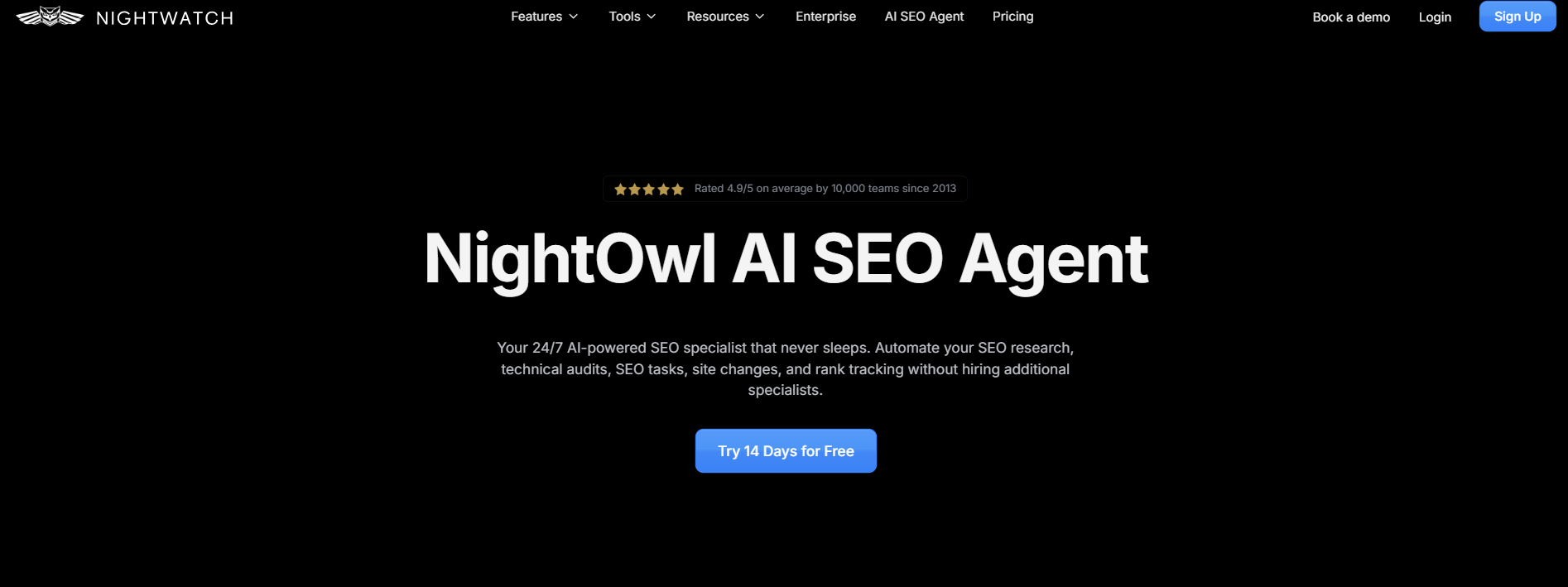
NightOwl is quickly becoming a favorite for marketers looking for a full-featured SEO platform that goes beyond basic content optimization. Unlike Surfer SEO, which often relies on estimated content scores, NightOwl provides actionable insights drawn from real-time SERP data so you can make smarter decisions about your content strategy. Its ability to track your rankings over time ensures you can see exactly how your content performs and make adjustments as needed.
One standout feature of NightOwl is its AI-powered content assistant, which helps you draft optimized copy and offers contextual recommendations. For instance, it can suggest internal linking opportunities, highlight gaps in topic coverage, and advise on keyword usage to improve your content relevance. These insights make it easier to create content that aligns with search intent and performs well in search engines. NightOwl also offers deep keyword research capabilities, which allow you to uncover long-tail opportunities that might be overlooked by other platforms.
Key Features
- Real-time SEO data for precise optimization decisions.
- AI-powered content assistant for drafting and optimizing copy.
- In-depth keyword research, including long-tail keywords.
- Rank tracking to monitor content performance over time.
- Contextual optimization advice, including interlinking suggestions.
- Competitor analysis for identifying gaps and opportunities.
Pros
- Provides actionable insights based on real SERP data.
- Strong AI writing and optimization guidance saves time.
- Includes rank tracking to monitor content performance.
- Offers interlinking and contextual optimization advice.
- Flexible for freelancers, small teams, and larger departments.
Cons
- Lacks some advanced reporting features for very large enterprises.
- Fewer third-party integrations compared to bigger SEO suites.
- Some features may take time to fully understand for beginners.
- AI suggestions sometimes need manual refinement for perfect results.
Pricing
NightOwl is available to all Nightwatch subscribers and starts at $32 a month.
Frase
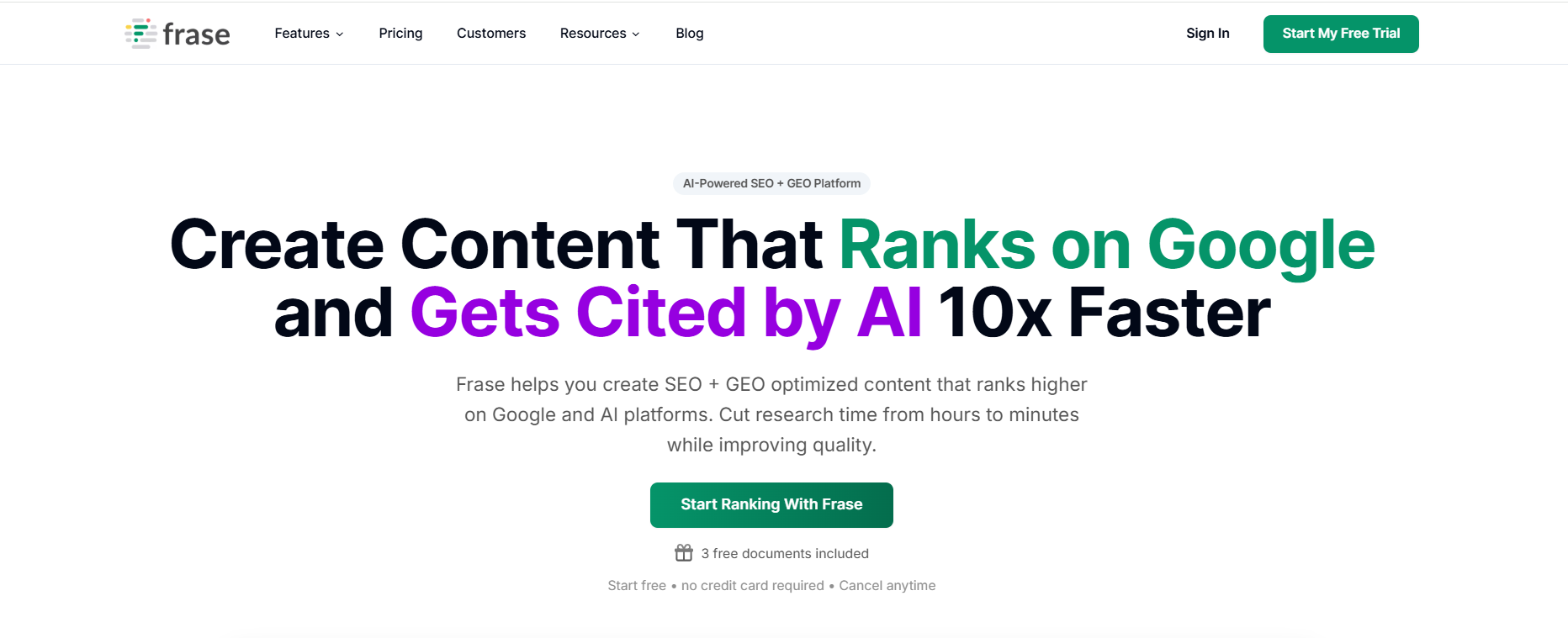
Frase is a powerful SEO and content optimization tool that focuses on helping marketers and content teams create high-quality content efficiently. It’s best known for its ability to generate detailed content briefs, which can save hours of research time. These briefs analyze top-ranking pages, identify key topics and questions, and provide clear guidance on what to include in your content.
Beyond content briefs, Frase offers AI-powered writing assistance that helps you draft articles, blog posts, or landing pages directly within the platform. Its contextual recommendations guide you on optimizing headings, incorporating important keywords, and covering relevant subtopics. Frase also includes built-in analytics to track how your content performs, and it can even provide suggestions to improve engagement and readability.
Key Features
- AI-powered content assistant for drafting optimized content.
- Automated content briefs based on top-ranking pages.
- Keyword and topic research integrated into briefs.
- Content scoring and optimization suggestions for better performance.
- Built-in analytics to track content engagement and rankings.
- Ability to answer common user questions and optimize for intent.
- Workflow management features for team collaboration.
Pros
- Saves time with automated content briefs and topic research.
- Strong AI writing support for faster content creation.
- Helps optimize content for search intent and user questions.
- Built-in analytics provides insight into content performance.
- Great for both teams and individual freelancers.
Cons
- Some AI-generated suggestions may need manual adjustments.
- Limited integrations compared to larger SEO suites.
- Can be overwhelming for beginners due to many features.
- Advanced analytics may require a higher-tier plan.
Pricing
Pricing starts at $38 a month.
MarketMuse
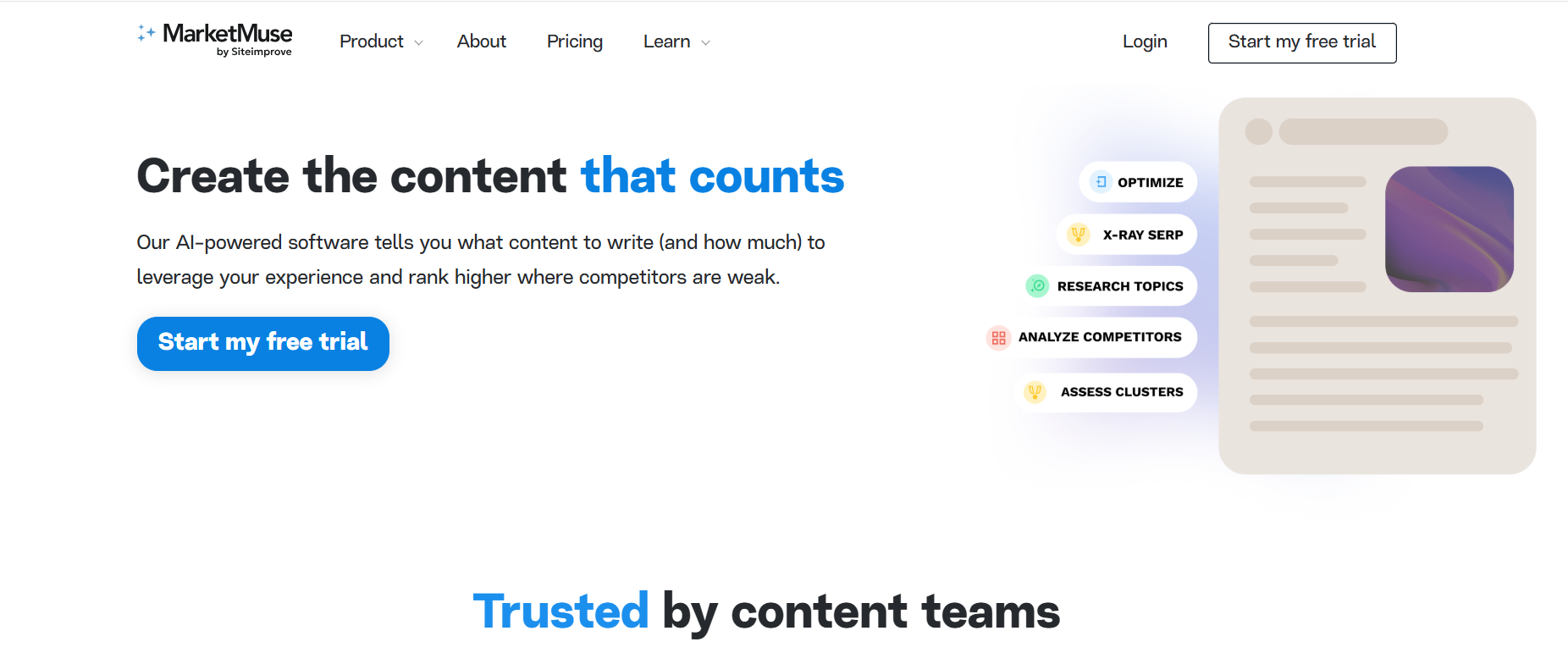
When it comes to creating truly authoritative content, understanding the full scope of a topic is key. MarketMuse excels at this by using AI to map out the landscape of any niche. Rather than relying solely on basic on-page scoring like many SEO tools, MarketMuse helps you uncover content gaps, identify high-impact opportunities, and plan articles that thoroughly satisfy both readers and search engines.
Its content scoring system evaluates depth, relevance, and authority, giving you a clear sense of how your content stacks up against competitors. The platform also helps prioritize which content opportunities will deliver the most value, letting teams focus on pieces that can significantly improve rankings and visibility.
Key Features
- AI-powered topic modeling for thorough content coverage.
- Automated content briefs with recommended keywords and subtopics.
- Content scoring to assess relevance, depth, and authority.
- Gap analysis to find missed opportunities in your niche.
- Opportunity prioritization to maximize content impact.
- Competitor content analysis for benchmarking.
- Workflow tools for managing multiple content projects.
Pros
- Helps produce in-depth, authoritative content that ranks well.
- Data-driven insights remove guesswork from content planning.
- Prioritizes high-impact content opportunities for ROI.
- Strong competitive analysis features.
- Suitable for teams of all sizes, from freelancers to enterprises.
Cons
- Pricing may be high for small teams or freelancers.
- Advanced features can take time to master.
- Some analytics are limited to higher-tier plans.
- Focuses more on content depth than basic on-page SEO tasks.
Pricing
MarketMuse’s pricing starts at $99 per month.
Clearscope
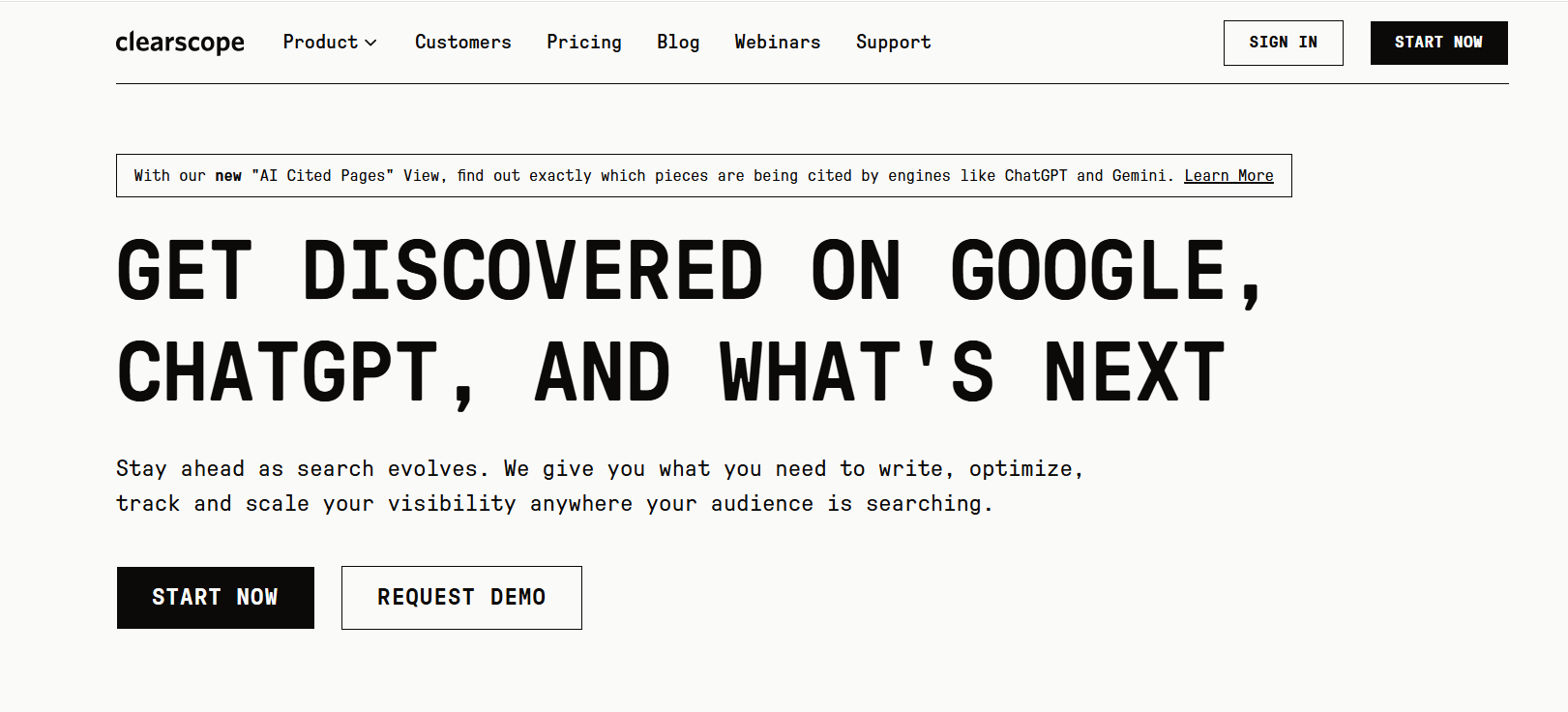
Ranking high in search engines requires creating content that’s readable, relevant, and authoritative. Clearscope makes this process straightforward through a combination of keyword research, content grading, and readability analysis in one platform. The tool analyzes top-performing content and provides actionable recommendations to improve your own articles. This ensures your content is optimized for both search engines and readers.
Key Features
- Keyword research with semantic analysis.
- Content grading for relevance and comprehensiveness
- Readability scoring to improve user engagement.
- Optimization suggestions based on top-ranking content.
- Integration with major CMS platforms for workflow ease.
- Competitive analysis for benchmarking content performance.
- Collaboration tools for team-based content creation.
Pros
- Simple, intuitive interface for fast optimization.
- Focuses on both SEO and readability for better engagement.
- Provides actionable suggestions based on real data.
- CMS integrations make content creation seamless.
- Great for content teams and individual writers alike.
Cons
- Limited advanced analytics compared to some larger SEO suites.
- Fewer workflow features for larger enterprises.
- May feel expensive for freelancers or small teams.
- Some users may want deeper keyword research capabilities.
Pricing
Pricing starts at $129 per month.
WriterZen
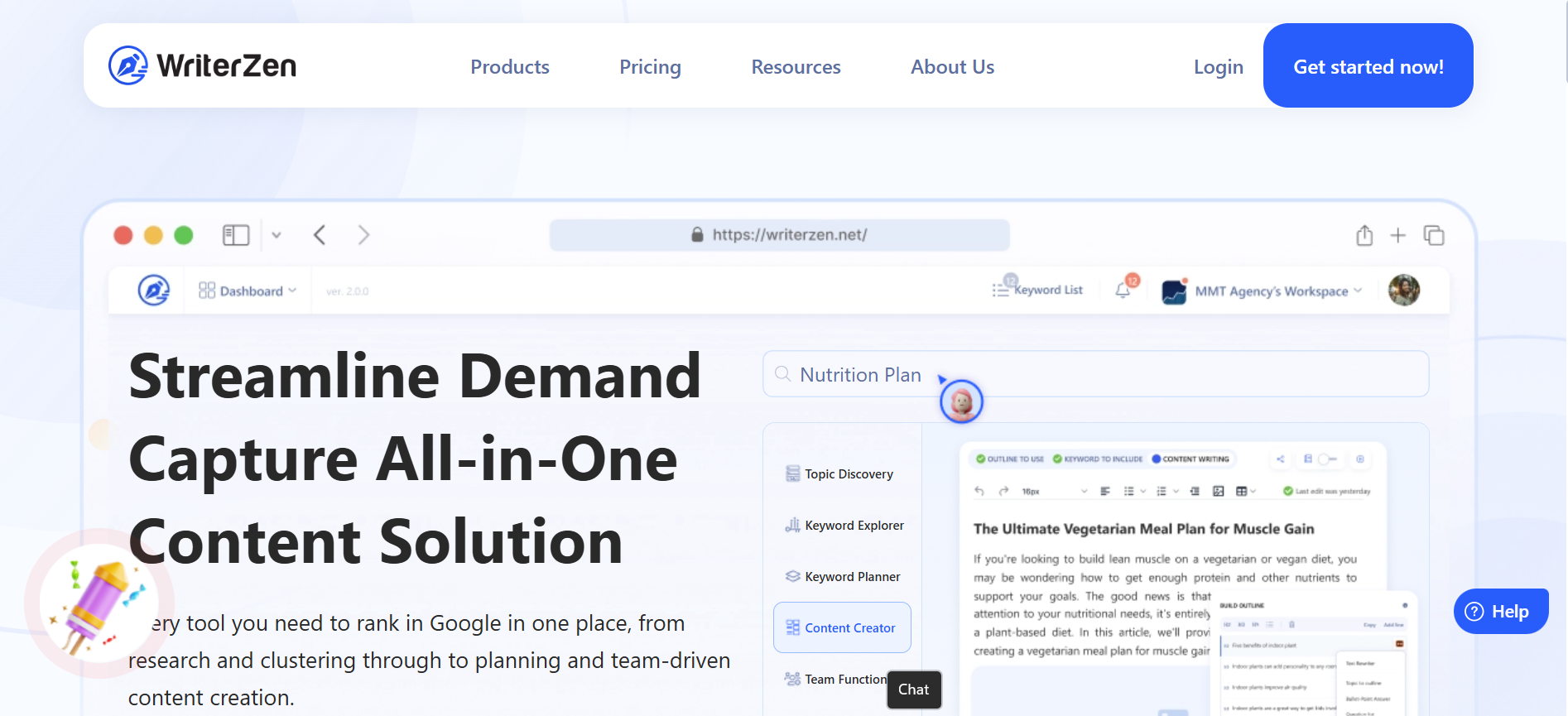
Many SEO tools focus on metrics, scores, and charts, but WriterZen takes a different approach: it transforms keyword research and content planning into a creative, organized workflow. Instead of overwhelming you with raw data, it helps you see the bigger picture of your niche, cluster related keywords, and discover content opportunities you might have missed. This makes content planning feel less like a chore and more like mapping out a strategy for meaningful engagement.
WriterZen’s strength lies in its combination of data and structure. Its keyword clustering tool groups related terms logically, helping you visualize content silos and topic relationships before you even start writing. Meanwhile, its AI assistant provides suggestions as you draft, so your content is both optimized and naturally readable. Competitive research is built into the workflow, giving insights into what’s working in your space and helping you make smarter decisions.
Key Features
- Keyword clustering for logical content organization.
- AI-powered writing assistance for drafting and optimization.
- Competitive research tools to uncover opportunities
- Content ideation and topic discovery for creative planning.
- SERP analysis to inform content strategy.
- Workflow and project management tools for teams.
- SEO performance tracking to measure results.
Pros
- Makes SEO research feel organized and intuitive.
- AI assistant improves writing speed without losing quality.
- Clustering helps create comprehensive content strategies.
- Built-in competitor insights support smarter decisions.
- Ideal for freelancers and content teams alike.
Cons
- Advanced features may take time to learn.
- AI suggestions sometimes require manual refinement.
- Some functionality is limited in lower-tier plans.
- Less robust analytics compared to enterprise SEO tools.
Pricing
Starts at a one-time payment of $75.
Content Harmony
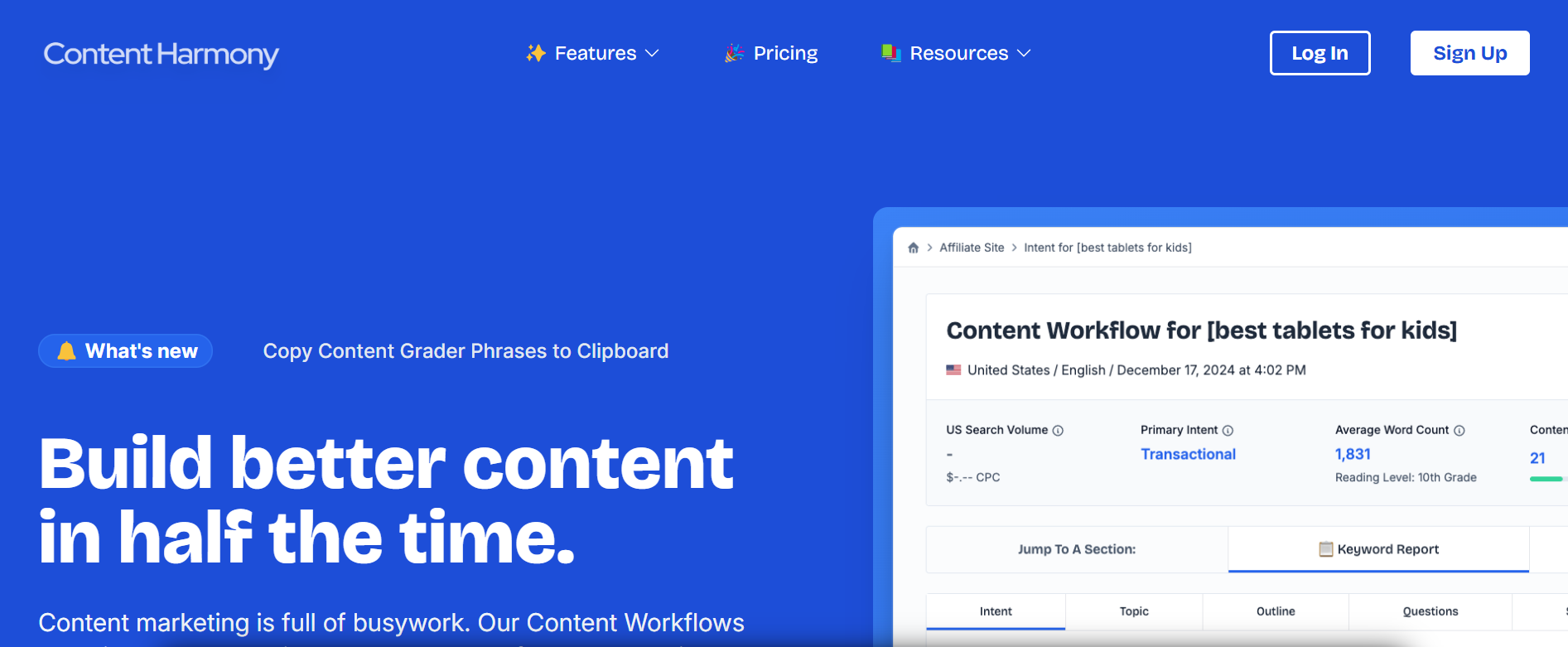
Content Harmony approaches SEO and content planning as a strategic process, helping teams transform research into actionable content plans. Instead of throwing raw metrics at you, it organizes ideas, identifies gaps, and prioritizes topics that will have the most impact.
You can map out content projects, assign tasks, and ensure that every piece of content aligns with broader marketing goals. Its research tools provide context and optimization advice, highlighting what your content needs to answer readers’ questions and cover topics comprehensively.
Key Features
- Content briefs that guide topic coverage and keyword usage.
- Strategic planning tools for mapping content projects.
- Contextual optimization and interlinking advice.
- Competitive research for benchmarking and gap analysis.
- Prioritization of content opportunities based on impact.
- Analytics to track performance and refine strategies.
Pros
- Helps teams plan content strategically rather than just optimizing pages.
- Provides actionable interlinking and contextual recommendations.
- Competitive research identifies gaps and opportunities.
- Workflow and task management streamline collaboration.
- Ideal for teams aiming to create a cohesive content strategy.
Cons
- Can feel complex for individual freelancers or beginners.
- Some advanced features are locked behind higher-tier plans.
- Less AI writing support compared to other tools.
- Not focused on detailed on-page SEO metrics alone.
Pricing
Pricing starts at $50 per month.
NeuronWriter
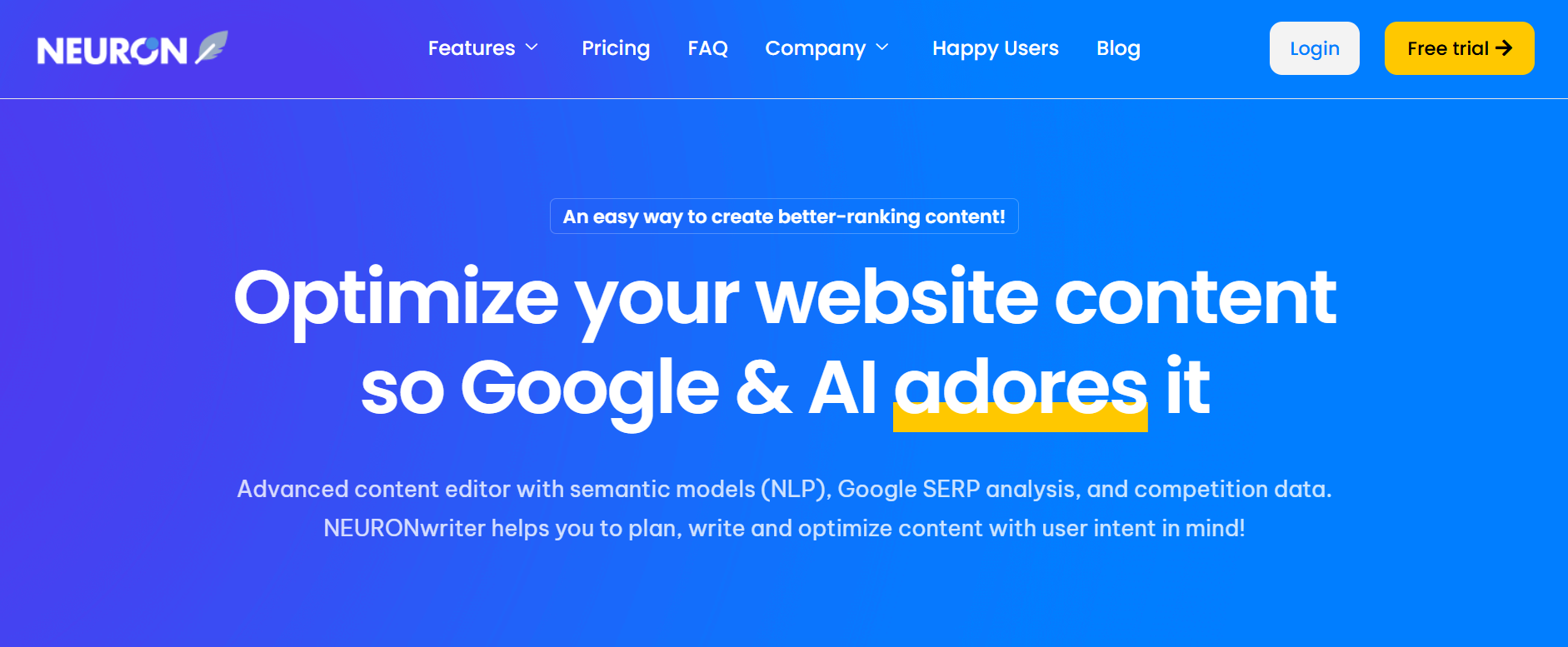
If you are a marketer who wants actionable SEO insights without getting lost in an overly complicated dashboard, NeuronWriter is a tool worth checking out. It focuses on giving real-time guidance while you write, highlighting exactly what your content needs to rank better. It suggests keywords, optimizes headings, and provides insight into your content’s readability and semantic relevance. Its SERP analysis shows what’s currently ranking in your niche, helping you understand where your content can outperform competitors.
Key Features
- Real-time content optimization guidance while writing.
- Keyword suggestions for improved search performance.
- SERP analysis to understand top-ranking content.
- Semantic relevance scoring for better topic coverage.
- Readability checks to ensure audience engagement.
- Affordable, accessible interface for freelancers and small teams.
- Actionable recommendations for headings, structure, and internal linking.
Pros
- Streamlined, easy-to-use platform for content optimization.
- Provides actionable recommendations in real-time.
- Affordable alternative suitable for freelancers and small teams.
- Balances SEO requirements with readability and engagement.
- SERP analysis helps refine content strategy effectively.
Cons
- Fewer advanced analytics compared to enterprise tools.
- Some AI suggestions may need manual adjustment.
- Limited workflow or project management features.
- Not as feature-rich for large content teams or agencies.
Pricing
Pricing starts at $23 a month.
Choosing the Right Surfer SEO Alternative: Why NightOwl Stands Out
Choosing the right SEO tool can make all the difference in how efficiently you plan, optimize, and track your content. While Surfer SEO has been a popular choice for content optimization, many marketers are seeking alternatives that offer more flexibility, deeper insights, or better value for money.
Tools like Frase, MarketMuse, Clearscope, WriterZen, Content Harmony, and NeuronWriter each bring unique strengths, ranging from AI-driven content briefs and topic modeling to workflow management and competitor analysis. Depending on your goals, team size, and budget, one of these alternatives could better fit your needs while helping you create content that ranks and engages readers effectively.
Among all these options, NightOwl stands out as a top choice for marketers looking for a Surfer SEO alternative. It combines real-time SEO insights, AI-powered content recommendations, comprehensive keyword research, and rank tracking into a single platform.
Ready to optimize smarter and get better results than ever? Explore NightOwl today and see why it’s the preferred choice for marketers seeking a complete Surfer SEO alternative.
